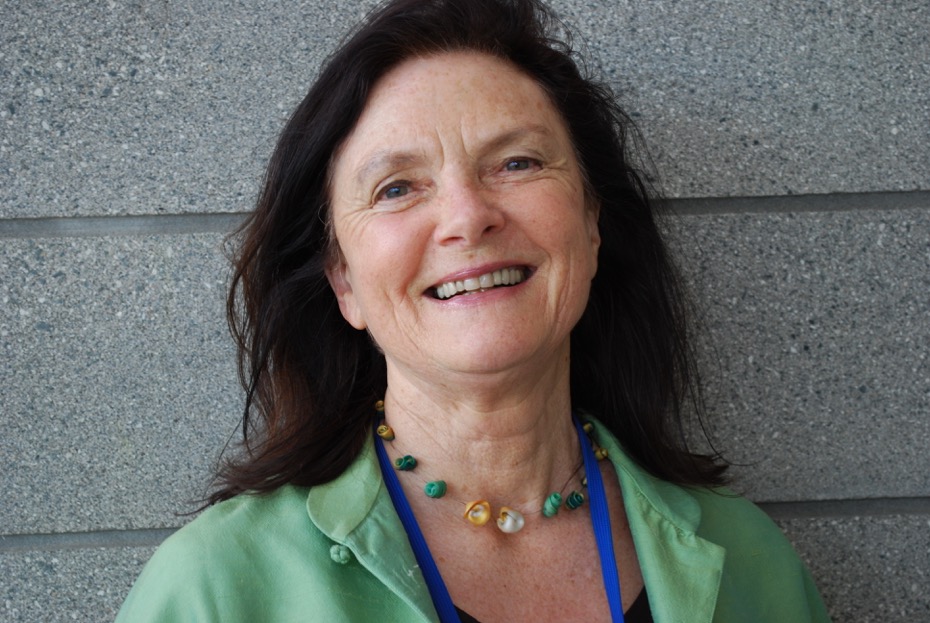Betsan Martin, Co-Chair of ECO New Zealand, attended the Small Islands Developing States Conference in Apia, Samoa, on behalf of ECO. The conference was held from 1-4 September, 2014, in Apia.
Betsan reports on her impressions and learnings:
This item is taking us out of our land environment to oceans and the September Small Islands Developing States conference in Samoa.
UN and global attention to Small Island Developing States (SIDS) is linked to the UN agendas of climate responsibility and sustainable development, recognizing the special case and vulnerability of Small Island States at Rio 1992 and at Rio+20 in 2012.
Betsan at SIDs, Samoa, with Ida Fuimaono on the left
Climate Change is now in Pacific Islands, it is not about the future as we commonly state. You might have thought that SIDS was a climate change negotiation conference. You might also have thought it was a renewable energy conference. You knew you were in the centre of the Pacific universe with the eloquence and hospitality, the incredible generosity which came not only from a magnificent State occasion – you felt that every village and school and church was on its toes to extend a Pacific welcome and ensure that visitors entered into the oceanic imagination and received the richness of the economy of giving at the heart of Samoa.
Rather that go with the idea of green economy for sustainable development, Pacific states prefer the ‘Blue Economy’ of an oceanic world – either way they are putting the ocean and land environment into the economic equation. Healthy oceans are essential to Island economies, as well as to the global economy.
Christiana Figueris, Executive Director of the UNFCCC said the blue economy is the only guarantee for the future. SIDS are at the forefront of the green/blue economy because they are natural resource economies. Most of the communities rely directly on fish, fruit, eggs, meat and vegetables grown in their own communities – so their livelihoods depend on healthy coastal and land management. You often heard ‘ridge to reef’ used to describe the direct effect of land use on coastal areas. If inland forests are felled the silting will destroy the fisheries.
Small Island States are at the frontlines of climate change, with their security threatened by the impacts of climate on food security, fisheries, floods and droughts and weather disasters, ocean acidification and population migration. Access to climate finance is needed to safeguard against the worst effects, and along with that to be releived of debt burdens. Climae finance will help with the costs of protecting oceans and fisheries, with water infrastructure, with agriculture and food security and with training and education to meet climate challenges.
The theme of sustainable development through partnerships made sense because Governments cannot lead development and transitions to green/blue economies alone. Business investment is need to catalyse innovation and provide expertise.
Partnerships between governments, private sector and NGO’s are vital for the management, regulation and protection of oceans and fisheries. In the world of global interdependence, Pacific Islands are seen as hampered by distance. Yet in Pacific world views, the oceans connect Islands. Oceans are an asset that bonds people together. Digital connectivity is seen as the way to overcome the tyranny of distance – that is one of the challenges of SIDS.
One idea that might sit uneasily with us, yet was proposed by Pacific leaders themselves was that Aid could be replaced by investment. Aid is often experienced as conditional and paternalistic, and susceptible to policy changes. It is not clear that investment would be fee from ‘self interest’ of investors but perhaps it was perceived as being mutually negotiated.
I went to the SIDS conference representing ECO on the IUCN Delegation, which included IUCN Oceania Director Taholo Kami. IUCN Oceania have set their course for the World Parks Congress with a magnificent vision of the Pacific navigational wakas sailing to Sydney. Here is a special link to the ‘blue’ environment http://youtu.be/m6YaQFNKg80
Talk of Green and Blue economies is rather suggestive of colours evoked at our election. We have to renew our environmental vigilance in our political context, and take some learning and inspiration from the sustainability initiatives and policy frontlines in the Pacific where environment is at the centre of economic development.
Betsan Martin
Co-Chair, ECO
betsan@response.org.nz
